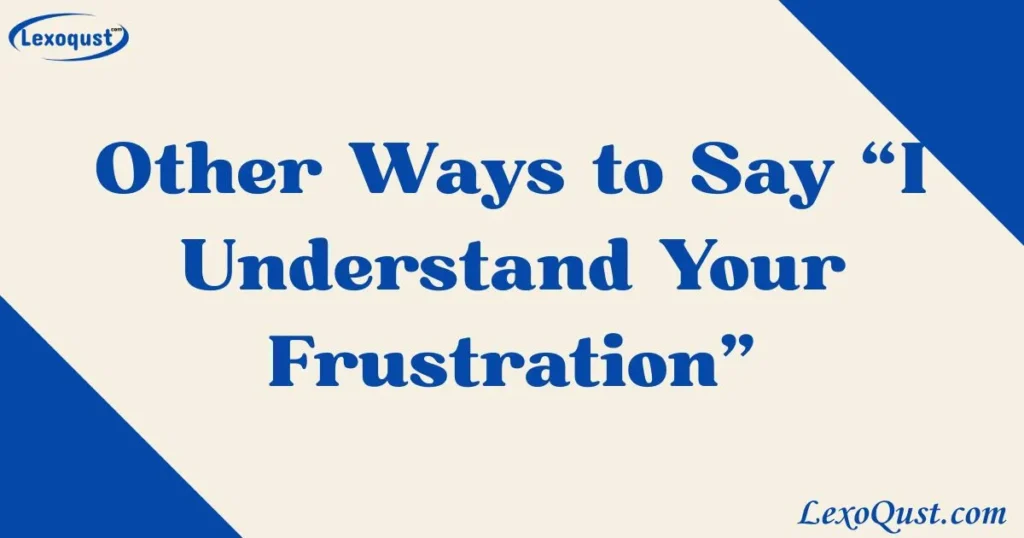Choosing the right words can transform how your message is received whether you’re writing an essay, business report, or personal letter. A common phrase like “I understand your frustration” certainly shows empathy, but it may not always strike the perfect tone.
In a professional setting, where maintaining professionalism and expressing empathy are equally important, selecting language that feels more personal and acknowledges frustration with sincerity is key to building trust.
This guide offers 30+ thoughtful alternatives that sound more empathetic and professional, helping you add nuance and warmth to your writing. Let’s explore how understanding can shine through in more meaningful ways.
What Does “I Understand Your Frustration” Mean?
The phrase “I understand your frustration” is used to acknowledge someone’s feelings of irritation, disappointment, or dissatisfaction. It conveys empathy and shows that you’re aware of the emotional impact a situation may have on the other person.
In both personal and professional contexts, this expression signals understanding and validates the person’s experience, which can help ease tension and build rapport. It is a form of emotional acknowledgment, often used to demonstrate support without necessarily agreeing with the cause of the frustration.
When to Use “I Understand Your Frustration”
You can use this phrase in situations where someone is visibly upset, disappointed, or overwhelmed. It’s common in customer service, team communication, counseling, and even personal conversations when a person feels unheard or mistreated.
For example, when a client is facing repeated delays or a colleague encounters persistent obstacles, saying “I understand your frustration” helps to build trust by showing empathy. This phrase is particularly helpful when trying to maintain professionalism while still feeling personal in emotionally charged interactions.
Is It Professional/Polite to Say “I Understand Your Frustration”?
Yes, the phrase is generally seen as both professional and polite. It strikes a balance between expressing empathy and maintaining professionalism. However, tone and context matter. Repeated or generic use can make the phrase sound insincere or scripted. That’s why it’s helpful to explore thoughtful alternatives like:
- “I hear your concerns, and they are valid.”
- “That sounds really difficult, and I appreciate your patience.”
- “It’s understandable to feel that way given the situation.”
These variations help your communication feel more empathetic and professional, adding depth and sincerity. Choosing the right words not only helps acknowledge frustration but also makes your message more impactful and human.
1. “I Can See Why That’s Frustrating”
Meaning: Acknowledges the other person’s struggle with a hint of shared perspective.
Definition: Expresses validation of someone’s feelings about a difficult situation.
Tone: Empathetic and understanding.
Example: “I can see why that’s frustrating it’s been a long wait with no clear update.”
Explanation: This phrase affirms the reader’s emotional response, helping them feel seen.
Purpose and Personalization: Use this to validate emotions while remaining professional. Adjust by emphasizing timing or impact: “I can see why this delay is especially frustrating.”
2. “I Hear You, That Sounds Really Annoying”

Meaning: Affirms emotional impact while reinforcing active listening.
Definition: Recognizes both what was said and how it felt.
Tone: Supportive and conversational.
Example: “I hear you, that sounds really annoying—especially after trying so many times.”
Explanation: Demonstrates genuine care and helps build connection.
Purpose and Personalization: Ideal for informal yet empathetic writing. Personalize it by swapping “annoying” with a more precise emotional descriptor.
3. “I Totally Get How You Feel”
Meaning: Communicates shared emotional understanding.
Definition: Expresses emotional alignment with the reader’s or client’s frustration.
Tone: Relatable and validating.
Example: “I totally get how you feel—this process has been exhausting.”
Explanation: This phrase bridges the gap between writer and reader by showing common ground.
Purpose and Personalization: Best in personal or semi-formal writing. Adjust with “completely” or “fully” for tone control.
4. “That Must Be Really Frustrating for You”
Meaning: Emphasizes the emotional burden the reader is experiencing.
Definition: Conveys empathy for the difficulty of the situation.
Tone: Gentle and considerate.
Example: “That must be really frustrating for you, especially after your efforts.”
Explanation: It humanizes the experience and invites a sense of care.
Purpose and Personalization: Great for thoughtful content or customer support. Personalize based on effort or time invested.
5. “I Can Imagine How That Would Be Frustrating”
Meaning: Expresses a sincere attempt to understand the reader’s viewpoint.
Definition: Acknowledges the situation and its emotional toll through imagination.
Tone: Thoughtful and respectful.
Example: “I can imagine how that would be frustrating when expectations weren’t met.”
Explanation: Shows the writer is mentally stepping into the reader’s shoes.
Purpose and Personalization: Use to bridge emotional distance. Tailor the situation details to deepen impact.
6. “That Must Be Difficult for You to Handle”
Meaning: Suggests emotional or mental strain due to a specific event or challenge.
Definition: Acknowledges the effort needed to cope.
Tone: Sympathetic and supportive.
Example: “That must be difficult for you to handle, considering everything else going on.”
Explanation: Reflects compassion and awareness of broader pressures.
Purpose and Personalization: Ideal for more serious tones; personalize with time context or competing pressures.
7. “I Understand How Challenging This Must Be”
Meaning: Signals deep recognition of the complexity of a situation.
Definition: Combines empathy with an understanding of obstacles involved.
Tone: Respectful and compassionate.
Example: “I understand how challenging this must be—it’s not a simple issue.”
Explanation: Highlights the mental and emotional labor being acknowledged.
Purpose and Personalization: Perfect for professional or therapeutic writing. Use more specific challenges when applicable.
8. “I Can Feel the Frustration in Your Words”

Meaning: Responds to emotional intensity in written or spoken communication.
Definition: Recognizes emotional cues indirectly.
Tone: Observant and validating.
Example: “I can feel the frustration in your words, and it’s totally justified.”
Explanation: Validates emotion even if the reader didn’t state it explicitly.
Purpose and Personalization: Great for written responses. Adjust the tone depending on intensity: “deep disappointment,” “clear tension,” etc.
9. “I Can Tell This Is Really Getting to You”
Meaning: Reflects an emotional toll without judgment.
Definition: Acknowledges that an issue is becoming mentally or emotionally exhausting.
Tone: Compassionate and conversational.
Example: “I can tell this is really getting to you—it’s been dragging on for too long.”
Explanation: Acknowledges exhaustion and frustration, making the reader feel understood.
Purpose and Personalization: Works well in support-focused content. You can soften or intensify it based on context.
10. “I Understand This Must Be Disheartening”
Meaning: Validates emotional letdowns or setbacks.
Definition: Acknowledges that the situation feels discouraging or demoralizing.
Tone: Gentle and empathetic.
Example: “I understand this must be disheartening, especially after your commitment.”
Explanation: Shows sensitivity to emotional highs and lows.
Purpose and Personalization: Perfect for responses involving unmet expectations. Adjust “disheartening” to suit tone: “disappointing,” “demotivating,” etc.
Keep Exploring: Other Ways to Say “Excited for What’s to Come”
11. “I Know This Has Been a Hard Situation”
Meaning: Recognizes the difficulty someone has been facing over time.
Definition: Expresses empathy for sustained emotional or situational hardship.
Tone: Reassuring and kind.
Example: “I know this has been a hard situation, and your patience hasn’t gone unnoticed.”
Explanation: Acknowledges ongoing effort and builds emotional trust.
Purpose and Personalization: Use in professional or supportive writing. You can swap in “tough,” “uncomfortable,” or “draining” depending on intensity.
12. “That Sounds Like a Tough Situation”

Meaning: Reflects understanding of the gravity or complexity of someone’s issue.
Definition: Affirms that the problem isn’t simple or easy to manage.
Tone: Relatable and kind.
Example: “That sounds like a tough situation—I can understand your frustration.”
Explanation: This phrase helps the reader feel less isolated in their struggle.
Purpose and Personalization: Effective in support-focused communication. Personalize with brief context: “a tough financial situation,” etc.
13. “I Understand This Is Frustrating for You”
Meaning: Directly acknowledges that the other person is emotionally affected.
Definition: Combines empathy with clear recognition of emotion.
Tone: Straightforward yet sensitive.
Example: “I understand this is frustrating for you, and I’m here to help.”
Explanation: Offers validation while keeping the door open for resolution.
Purpose and Personalization: Use in empathetic but efficient responses. Personalize by noting specific frustration sources.
14. “I See Why You’d Be Frustrated”
Meaning: Validates emotions based on a shared assessment of the situation.
Definition: Shows mutual understanding of why a response is justified.
Tone: Respectful and supportive.
Example: “I see why you’d be frustrated with the repeated delays.”
Explanation: Demonstrates logic behind empathy—adds weight to the acknowledgment.
Purpose and Personalization: Excellent in professional settings. Adapt using “disappointed,” “let down,” or “discouraged” for tone shifts.
15. “It Makes Sense Why You Feel This Way”
Meaning: Signals that the reader’s emotional reaction is reasonable.
Definition: Validates the logic behind emotional expression.
Tone: Affirming and respectful.
Example: “It makes sense why you feel this way, given the circumstances.”
Explanation: Promotes emotional intelligence and understanding.
Purpose and Personalization: Ideal for emotionally charged contexts. Add detail for personalization: “after all your effort.”
16. “I Know This Is a Challenging Moment”

Meaning: Recognizes current emotional or logistical hardship.
Definition: Conveys understanding that the reader is facing difficulty right now.
Tone: Supportive and grounding.
Example: “I know this is a challenging moment, and I appreciate your strength.”
Explanation: Helps stabilize the reader by acknowledging the present reality.
Purpose and Personalization: Use during crisis or transitions. Replace “moment” with “phase” or “period” as needed.
17. “I Can See Why You’re Upset”
Meaning: Validates visible or clearly expressed emotional discomfort.
Definition: Clearly acknowledges another person’s anger or distress.
Tone: Compassionate and non-judgmental.
Example: “I can see why you’re upset, and I want to help make it right.”
Explanation: Acknowledges intensity without confrontation.
Purpose and Personalization: Best in conflict resolution. Adjust tone by using “concerned” or “bothered” if needed.
18. “It’s Easy to See Why You’re Frustrated”
Meaning: Shows immediate understanding of emotional response.
Definition: Suggests the cause of frustration is clear and understandable.
Tone: Validating and empathetic.
Example: “It’s easy to see why you’re frustrated with this mix-up.”
Explanation: Highlights clarity and reason behind the frustration.
Purpose and Personalization: Great for email support. Personalize by naming the issue: “delays,” “lack of communication,” etc.
19. “I Recognize This Must Be Annoying for You”
Meaning: Acknowledges minor but persistent issues that cause irritation.
Definition: Accepts that repeated discomfort or inconvenience is valid.
Tone: Calm and understanding.
Example: “I recognize this must be annoying for you—thank you for hanging in there.”
Explanation: Balances empathy with professionalism.
Purpose and Personalization: Ideal for addressing minor issues. Personalize using the context: “this back-and-forth,” “this glitch,” etc.
20. “I Know This Has Been a Frustrating Experience”

Meaning: Acknowledges the emotional arc of a situation.
Definition: Confirms prolonged or repeated sources of frustration.
Tone: Honest and empathetic.
Example: “I know this has been a frustrating experience, and we’re committed to making it right.”
Explanation: Combines reflection and reassurance.
Purpose and Personalization: Great for resolving past issues. Add sincerity with phrases like “from start to finish.”
21. “I Can Appreciate How Annoying This Is”
Meaning: Expresses active effort to understand the other’s perspective.
Definition: Suggests awareness of how unpleasant something must feel.
Tone: Respectful and validating.
Example: “I can appreciate how annoying this is, especially given your expectations.”
Explanation: Offers connection and humility in tone.
Purpose and Personalization: Good in both informal and formal settings. Change “annoying” to match tone: “disruptive,” “stressful,” etc.
Find Out More: Other Ways to Say “Challenging But Rewarding”
22. “This Must Be Extremely Aggravating”
Meaning: Acknowledges intense irritation or helplessness.
Definition: Emphasizes how emotionally taxing the situation is.
Tone: Strong and sympathetic.
Example: “This must be extremely aggravating—I can understand your concern.”
Explanation: Conveys seriousness without overpromising.
Purpose and Personalization: Best for high-stakes support. Customize with the situation: “losing time,” “not being heard,” etc.
23. “I Understand This Is a Difficult Situation”
Meaning: Recognizes complexity without placing blame.
Definition: Communicates empathy for a tough issue.
Tone: Neutral yet warm.
Example: “I understand this is a difficult situation, and I’m here to support you.”
Explanation: Centers empathy while avoiding judgment.
Purpose and Personalization: Use in sensitive conversations. Add “for everyone involved” to broaden understanding.
24. “I Get Why This Is Getting Under Your Skin”
Meaning: Recognizes an irritation that has built up over time.
Definition: Conveys familiarity with emotional exhaustion or annoyance.
Tone: Informal and empathetic.
Example: “I get why this is getting under your skin—it’s happened more than once.”
Explanation: Uses relatable language to bond.
Purpose and Personalization: Perfect for conversational writing. Adjust tone with alternatives like “weighing on you.”
25. “I Can Tell This Is Taking a Toll on You”
Meaning: Highlights emotional or physical fatigue.
Definition: Acknowledges the draining effect of an ongoing issue.
Tone: Serious and supportive.
Example: “I can tell this is taking a toll on you—let’s find a way forward.”
Explanation: Shows attentiveness to the reader’s well-being.
Purpose and Personalization: Best for mental health or coaching contexts. Personalize with time span or intensity.
26. “I Realize How Frustrating This Can Be”
Meaning: Conveys awareness of how common yet annoying issues can be.
Definition: Signals empathy for expected but irritating challenges.
Tone: Level-headed and calm.
Example: “I realize how frustrating this can be—especially when it’s out of your control.”
Explanation: Offers validation without dramatization.
Purpose and Personalization: Useful for recurring challenges. Add timing: “at the end of the day,” “every time.”
27. “It’s Completely Understandable That You’re Upset”
Meaning: Confirms emotional response is logical and justified.
Definition: Offers both empathy and rational support.
Tone: Affirming and neutral.
Example: “It’s completely understandable that you’re upset after this confusion.”
Explanation: Strengthens trust by validating perspective.
Purpose and Personalization: Great for formal situations. Swap “upset” for “disappointed” or “overwhelmed” to match tone.
28. “I Acknowledge How Difficult This Has Been”
Meaning: Shows active recognition of the reader’s emotional journey.
Definition: Offers respect for emotional or practical effort.
Tone: Thoughtful and formal.
Example: “I acknowledge how difficult this has been, and I appreciate your resilience.”
Explanation: Goes beyond empathy into recognition.
Purpose and Personalization: Perfect for client or team reflection. Add timeframe for depth.
29. “I Know This Is Really Testing Your Patience”
Meaning: Highlights emotional endurance being strained.
Definition: Acknowledges the pressure of waiting or persisting.
Tone: Reassuring and candid.
Example: “I know this is really testing your patience—we’re almost there.”
Explanation: Combines honesty with encouragement.
Purpose and Personalization: Ideal for long delays or ongoing conflict. Adjust with “persistence” or “focus” if needed.
30. “I Can See Why This Would Be So Exasperating”
Meaning: Signals extreme or repeated annoyance.
Definition: Validates that the situation is intensely frustrating.
Tone: Sincere and direct.
Example: “I can see why this would be so exasperating—it’s been dragging on far too long.”
Explanation: Uses stronger emotion to show full empathy.
Purpose and Personalization: Great for escalation scenarios. Choose lighter or heavier synonyms based on tone.
31. “I Know You’ve Been Holding It Together”
Meaning: Recognizes emotional restraint or strength during difficulty.
Definition: Acknowledges silent struggle and resilience.
Tone: Encouraging and heartfelt.
Example: “I know you’ve been holding it together, and that means a lot.”
Explanation: Reinforces emotional support and admiration.
Purpose and Personalization: Use in deeply personal writing. Personalize with achievements or sacrifices noticed.
32. “You’ve Been Dealing with So Much”
Meaning: Recognizes emotional or situational overload.
Definition: Highlights multiple ongoing challenges.
Tone: Compassionate and warm.
Example: “You’ve been dealing with so much—I completely understand your reaction.”
Explanation: Offers broad validation of hardship.
Purpose and Personalization: Effective in personal support letters or messages. Adjust by naming key burdens.
33. “I Know You Were Expecting Better”
Meaning: Validates disappointment due to unmet expectations.
Definition: Acknowledges emotional investment and outcome mismatch.
Tone: Respectful and considerate.
Example: “I know you were expecting better, and I’m sorry we missed the mark.”
Explanation: Helps preserve trust by owning the issue.
Purpose and Personalization: Perfect in client or peer responses. Tailor with what exactly was expected.
34. “You Deserve Better Than This”

Meaning: Communicates support and affirmation after a letdown.
Definition: Confirms someone’s worth in contrast to poor treatment.
Tone: Affirming and empowering.
Example: “You deserve better than this, and we’ll do what we can to fix it.”
Explanation: Combines advocacy with empathy.
Purpose and Personalization: Best for advocating tone. Personalize with tone boosters like “honestly” or “truly.”
35. “Anyone Would Be Frustrated in Your Shoes”
Meaning: Normalizes emotional reaction by widening the lens.
Definition: Emphasizes that the reaction is universally valid.
Tone: Supportive and disarming.
Example: “Anyone would be frustrated in your shoes this isn’t easy to handle.”
Explanation: Reduces shame and validates emotional honesty.
Purpose and Personalization: Excellent in group settings. Adjust metaphor: “in your position,” “with what you’ve faced.”
Pros and Cons of Different Phrases
| Phrase Type | Pros | Cons |
|---|---|---|
| Formal | Professional and respectful. Shows empathy clearly. | Can feel distant if overused. |
| Casual | Friendly and relatable. Creates approachability. | Might seem unprofessional in formal settings. |
| Reflective | Validates emotions effectively. Encourages dialogue. | May feel repetitive if overused. |
Key Insight
1. What are some polite alternatives to “I understand your frustration”?
You can say “I hear you” or “That sounds really challenging.” These phrases acknowledge feelings without dismissing them.
2. How can I show empathy in professional emails?
Use phrases like “Thank you for sharing your concerns” or “I want to help resolve this quickly.” They sound formal yet empathetic.
3. When is it appropriate to use casual alternatives?
Casual phrases like “I get it!” or “I hear ya” work in informal chats. They create a friendly and relatable tone.
4. Can body language help convey understanding?
Yes, nodding, eye contact, and leaning forward show that you are listening. Body language reinforces empathy naturally.
5. Are there phrases to avoid when addressing frustration?
Avoid “Don’t worry about it” or “It’s not a big deal.” These can feel dismissive and invalidate feelings.
Conclusion
Choosing the right words to acknowledge frustration can turn ordinary writing into a powerful tool for expressing empathy and maintaining professionalism. These thoughtful alternatives to “I understand your frustration” help you connect more deeply with readers while staying true to your tone.
Whether you’re drafting a personal letter, refining a blog post, or composing a professional response, using language that feels more personal builds trust and shows care. I hope this guide becomes a helpful resource in your writing journey. Try weaving these phrases into your own work and watch your communication grow more empathetic and effective every time.

Hi! I’m Amelia Ashford, the admin of Lexoqust.com. Here, we dive deep into the world of synonyms to help you express yourself better.From everyday words to advanced vocabulary, Lexoqust makes your writing richer and more refined.



